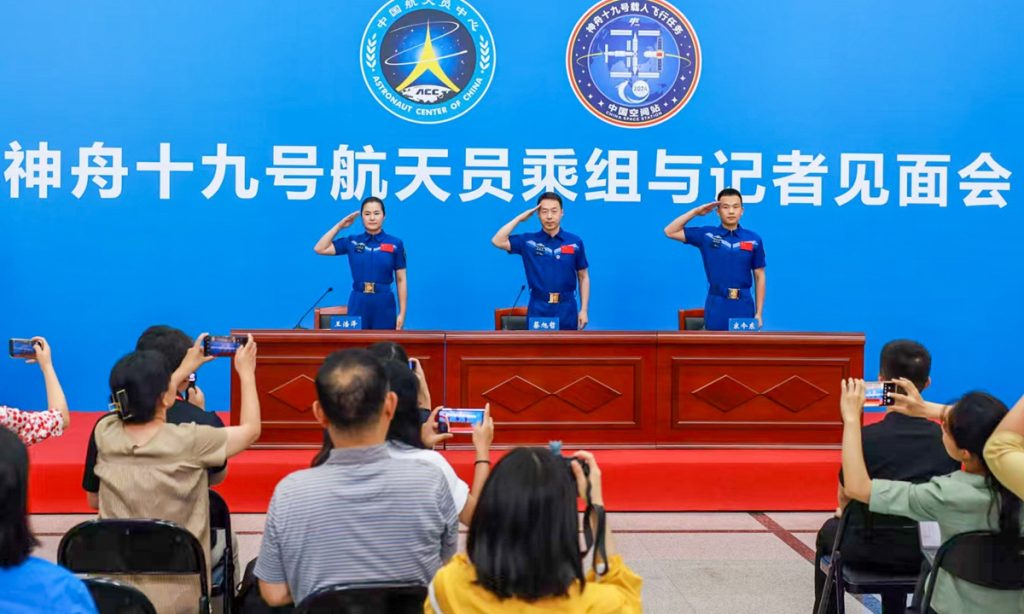Shenzhou-19 crew makes public debut after return to Earth

The Shenzhou-19 manned spaceflight crew made its public debut on Wednesday afternoon at a press event held in the Astronaut Center of China (ACC) in Beijing, over 2 months after their return to Earth. The crew spent 183 days living and working in the China Space Station during the mission.
Cai Xuzhe, serving as mission commander of the Shenzhou-19 as well as the earlier Shenzhou-14 manned spaceflight mission, shared with the press on Wednesday that "each flight mission is not a simple repeat of the previous one, but a continuous leap toward a higher level."
According to Cai, the crew carried out 88 experiments during their stay in orbit, covering fields such as space life sciences, microgravity fundamental physics and aerospace medicine. They also successfully prepared more than 13 types of 102 experimental samples.
Additionally, the Shenzhou-19 taikonauts also completed tasks including in-orbit testing and verification of a space station pipeline inspection robot, object weight perception tests, emotional state testing capability assessments and experimental sample replacements.
Cai, during the extravehicular activities of the Shenzhou-19 mission, set multiple records. His first spacewalk lasted nine hours, breaking the world record for the longest single spacewalk, and he completed a total of five spacewalks across two missions, making him the taikonaut with the most spacewalks to date.
Cai emphasized that "every successful spacewalk is the result of the crew's unity and the seamless coordination between space and ground, fully demonstrating the reliability of the extravehicular spacesuit and the confidence in Chinese aerospace technology."
Cai also recalled how they managed to fix an unexpected payload adapter jamming problem during their first spacewalk, saying that facing challenges such as tight time constraints and unfamiliarity with the extravehicular equipment, the crew calmly responded after receiving training via space-ground video calls with the ground team. After exiting the cabin, they assessed the equipment's condition and, following communication with the ground support team, successfully resolved the issue. When he heard the enthusiastic applause from the ground support team through his earpiece, he felt deeply "proud of the leading role and value that taikonauts play in manned spaceflight."
Song Lingdong, China's first taikonaut born in the 1990s who has performed a spacewalk, said the moment he opened the hatch was a moment that his dream came true.
"Performing a spacewalk as a post-1990s is our generation's mission, and this moment was destined to arrive," he said.
Interestingly, Song also took the lead in attempting to grow sweet potatoes in orbit during the mission, and the plants showed very good growth.
"I collected samples of these sweet potatoes as per ground instructions and brought them back, which would provide crucial data for verifying the feasibility of sweet potatoes as a food source for long-term spaceflight," Song said.
Wang Haoze, the third member of the crew who is also the country's first female flight engineer to enter the space station, said she has brought new energy to the crew with her meticulous operational habits, scientific thinking and gentle demeanor.
Having confidently completed all tasks, she said at the Wednesday event that "being able to contribute more to scientific exploration and showcase the brilliance of women to the world makes all my efforts profoundly meaningful."
According to the ACC, the Shenzhou-19 crew has completed the isolation recovery and recuperation phases and has fully transitioned to the observation and recovery phase.
Currently, under the close care and support of the scientific support team at the ACC, the Shenzhou-19 crew is in good physical and mental condition. All medical examination results are normal, and their muscle strength, endurance and cardiovascular functions during exercise have essentially returned to pre-flight levels. After completing all tasks in the recovery period and undergoing a health assessment, the three astronauts will resume normal training, the center disclosed.